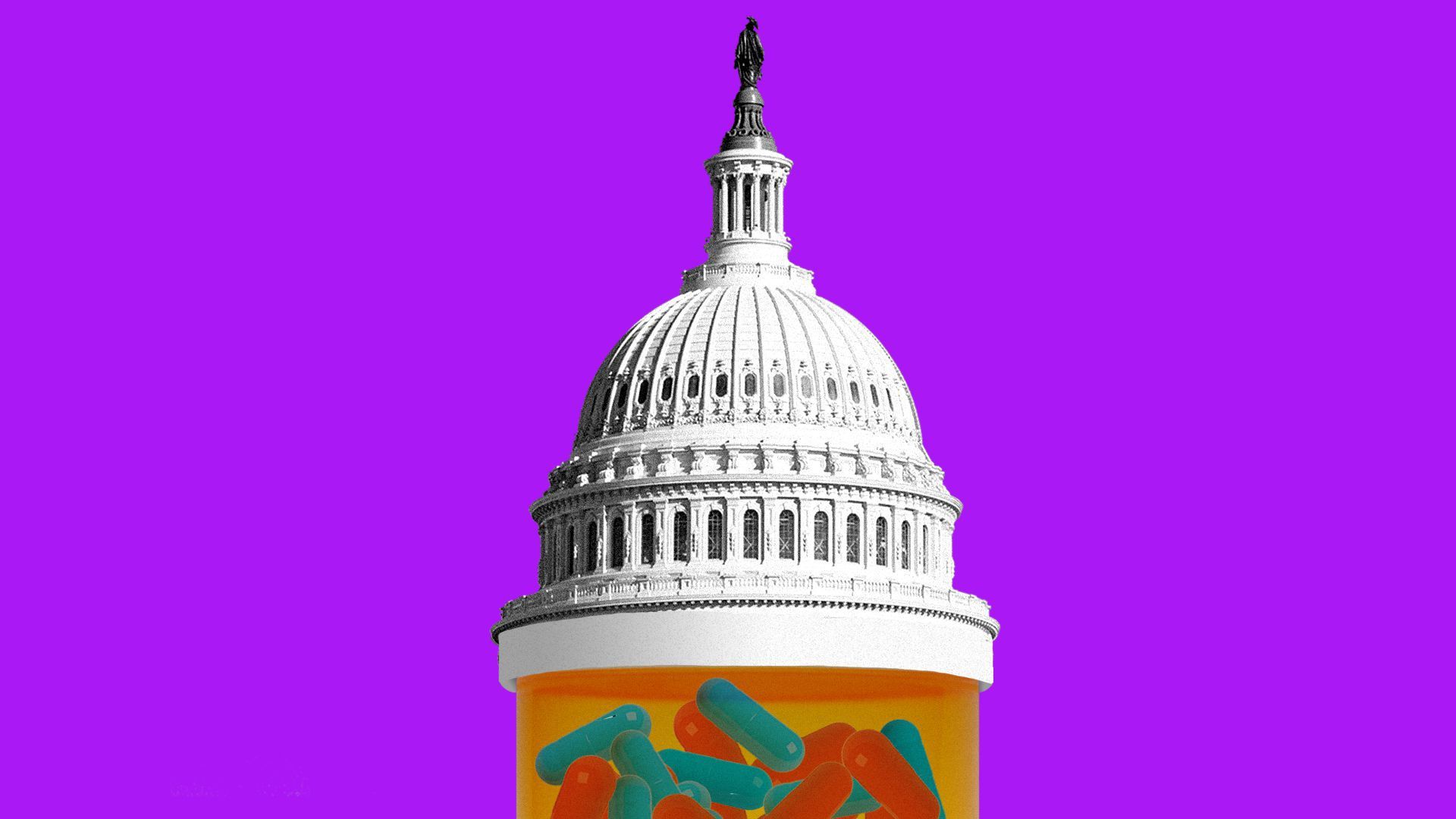The infrastructure drug deal
Add Axios as your preferred source to
see more of our stories on Google.

Illustration: Sarah Grillo/Axios
Senate Democrats have a new pay-for to finance a "soft" infrastructure bill: renegotiating Medicare prescription drug prices to save $600 billion — setting up a battle between progressives and well-capitalized drug companies.
Why it matters: By targeting pharma, Democrats are opening up a funding stream President Biden didn't initially include in his $4 trillion Build Back Better agenda. It relied on hiking taxes on corporations and Americans earning over $400,000.
- Democrats also pick a fight with an industry prepared to spend millions to fend off attempts to alter its lucrative reimbursement rates.
- Using drug-price savings to finance an already complex legislative package adds another powerful player to a game with no margin for error — complicating final passage of the legislation.
What they are saying: “It's time that the pharmaceutical industry realizes that the federal budget is not a cow to be milked,” Sen. Elizabeth Warren (D-Mass.) told Axios.
- Sen. Bernie Sanders (I-Vt.), chair of the Senate Budget Committee, not only confirmed the $600 billion figure but suggested it was slightly higher.
- "I am definitely in favor of saving money from pharmaceutical drug prices," said Sen. Joe Manchin (D-W.Va.). “I think Medicare should be competitive. It’s bullshit that Medicaid is and Medicare is not. That doesn’t make any sense at all.”
- The federal government already exerts its considerable market power to negotiate down Medicaid drug prices.
The big picture: Renegotiating Medicare drug prices has long been a goal of Democratic politics, but the industry has successfully thwarted efforts to cut its profits.
- In May, the path ahead for the House’s drug pricing bill — HR 3, the technical name for a measure allowing Medicare to negotiate prices — suffered a blow when 10 centrist Democrats signaled their opposition in a letter to Speaker Nancy Pelosi (D-Calif.).
- In the Senate, any bill would face an even heavier lift, because it would require the support of all 50 Democrats.
Driving the news: Democrats are proceeding with a two-track infrastructure process: a $579 billion infrastructure "hard" package to pay for roads and bridges, and a Democrat-only, $3.5-trillion, tax-and-spending plan covering other concerns like climate change and child care.
- Biden paid Senate Democrats a lunchtime visit Wednesday to sell both packages. "We’re going to get this done," he later told reporters.
- Democrats working on the bipartisan component insist they're closing in on a deal, Axios' Alayna Treene reports.
- "I am optimistic that we can resolve the remaining issues and be in a place for floor action next week," Sen. Chris Coons (D-Del.) said.
- Sen. Jon Tester (D-Mont.), a key negotiator, echoed the same timeline.
Between the lines: The industry is counting on Democrats like Sen. Bob Menendez (N.J.), whose state is home to many drug companies, to fend off any challenges. Menendez was noncommittal.
- "I got to look at the whole package," he told Axios.
- "They will be at the table and participate in some way. What this is, and what’s the amount? That’s an open question."
- His Democratic colleague from New Jersey, Sen. Cory Booker, appeared more open to the proposal.
- "It’s an aberration of the free market not to be able to negotiate for drug prices," Booker told Axios.
